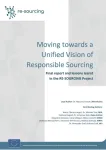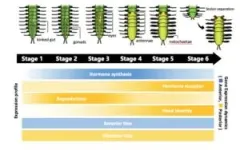(Press-News.org) Experts have delivered a sweeping prescription to governments, civil society and industry for a globally coordinated approach to the responsible sourcing of raw materials needed to achieve a circular green economy.
In a report, the four-year EU-funded RE-SOURCING project proposes adopting the global vision of a circular economy and reduced resource consumption by 2050 and outlines a series of interim milestones and targets for three key industrial sectors: renewable energy, mobility, and electric and electronic equipment.
The report (at https://bit.ly/3uqXlqT from 22 November) acknowledges several firms and governments are showing leadership in responsible sourcing to address troubling global environmental, social and economic issues, including:
Biodiversity and habitat protection, land, air and water pollution, climate change
Access to clean water, air & health care, gender equality, human rights, respecting land rights, labour rights, and safeguarding the artisanal and small-scale miners
Corruption and money laundering, promoting sustainable growth and development, and enabling national / local industrial development
At the same time, they underline that “the corporate behaviour that existed in the preceding century is no longer acceptable. More responsible and sustainable practices need to be undertaken and evidenced.”
Adds the report that the underlying message from stakeholders across the board is that “industry and its supply chains must incorporate and reflect societal values in their operations and business management” and “power imbalances, where they impede the ability of a group to affect the decisions that impact them, need to be addressed.”
Lead author Masuma Farooki says achieving responsible sourcing begins with a universally accepted definition and commonly agreed targets for 2050, proposing the following in the report:
1: Circular economy and decreased resource consumption
2: Meeting the Paris Agreement climate goals and environmental sustainability
3: Social sustainability and responsible production
4: Responsible procurement
5: Level-playing field and international cooperation
International cooperation, the report notes, means helping companies, regions, and countries improve practices and achieve agreed standards. A level playing field “is paramount for achieving all other targets.”
The report strongly underlines the need to address the power imbalance between local communities, workers and other affected stakeholders in decision-making, enabling their meaningful participation in decision-making.
Transparency is also fundamental. Consumers need to know how elements of the products they buy are derived, with adequate information to choose sustainably sourced products.
Key points in the report include:
Companies should not pass along to communities and workers the costs of negative impacts, such as pollution and land degradation
To reduce corruption and the financing of violence that have often accompanied extractive activity, transparency is needed in financial payments and material flows in supply chains
Standards and guidelines based on multi-stakeholder consultations, as well as certification schemes, and government regulations and legislation, are needed, citing several examples from the US and Europe
Among many recommendations to policymakers:
Strengthen international cooperation to develop harmonized mining standards for responsible extraction
Enable responsible mining in Europe (no more ‘burden-shifting’ to other regions)
Update mining regulations based on existing voluntary certification schemes
Eco-design policies for solar PVs and wind turbines
Lower taxes on, and give preference to, goods manufactured with higher social and environmental standards
Recycling:
Support recycling activities and create markets for secondary raw materials
Require Life Cycle Assessments for all new technologies/products
Develop and implement environmental regulations for wind turbine and solar PV manufacturing and recycling
Wider Policy:
Harmonize environmental policies of EU Member States and coordinate responsible sourcing reporting criteria
Protect human rights defenders and support civil society capacity building
Make supply chain due diligence mandatory for all
Ensure that raw materials and products imported from outside the EU fulfill the same sustainability requirements as operations inside the EU
Recommendations for industry include:
Mining:
Fleet electrification and decreased energy intensity
Plan for mine closure from the beginning of project development
Support local procurement
Manufacturing:
Include eco-design from the beginning of product development to improve recyclability
Include ‘social life cycle assessment’ in product development
Firmly eliminate modern slavery and forced labour in the supply chain of solar PV and wind turbines
Recycling:
Improve collaboration between supply chain stages, research, and academia to substitute non-recyclable materials
Cooperate with other sectors to improve reuse of non-recyclable materials.
Corporate strategies:
Environment and climate reporting, including greenhouse gas accounting and reporting for the entire supply chain
Tailor-made climate protection projects
International application of environmental and social standards
The report provides specific roadmaps and recommendations for policymakers and companies in the renewable energy, mobility sector, and the electronic product sectors.
It also takes a special look at three regions: Latin America, Africa, and China.
Latin American mining projects can face particularly strong opposition from local communities. According to the Environmental Justice Atlas (EJAtlas 2023), 45% of reported conflicts worldwide are in Latin America, where projects are often located near sensitive, biodiverse ecosystems, many of which are home to vulnerable communities.
A key regional priority, therefore, is “strengthening of social capital and civil society trust in the mining sector with focus on the local communities.”
African regional challenges include “trustful and transparent collaboration” by industry, local governments, and others. “If the mining sector, communities, supply chain and governments work together, the outlook for the industry on the continent will be bright”
Among other key considerations for Africa: supporting and improving artisanal and small-scale mining operations, which plays a crucial role in obtaining many raw materials essential for the green transition.
China, meanwhile, dominates the critical green-energy technology minerals supply chain with rising investments abroad. A recent report associated China, however, with over 100 human rights abuses, environmental harms, workers’ rights violations and other allegations over the past two years in Indonesia, Peru, Congo, Myanmar, Zimbabwe and other countries.
It also notes China’s creation of guidelines to align companies’ due diligence with international standards.
The report adds that similar allegations are made against mining operations linked to Canadian, USA, UK, Australian and European companies and investors.
In the end, the report cautions, “the findings just underline growing concerns that the green transition to renewable energy is repeating unjust business practices that have long dominated fossil-fuel and mineral extractions.”
Comments
Stefanie Degreif, OEKO Institute, Germany: “Significant and systemic changes are needed now and over the next decades to achieve climate targets and make the lithium-ion battery chain more responsible and sustainable. There is no time to waste - we need to act now! Changes are needed and cannot be postponed to the next generation or next legislation period”
Andreas Endl, Vienna University of Economics and Business (WU), Austria: “Over the course of the last four years, we investigated closely and informed decision makers about the fast-moving and immensely dynamic discourse on responsible sourcing. While progress has been made on many fronts with stricter legislation and successful business cases, we still have to go a long way to improve the livelihoods of affected people and respect the integrity of the environment”
Michael Tost, Montanuniversität Leoben, Austria: “A sustainable energy transition can be successfully achieved only if all actors including policy makers, industry, and civil society realize their responsibility in openly discussing and engaging with affected communities to create trust.”
Shahrzad Manoochehri, World Resources Forum Association, Switzerland: “Due to the complexity and interconnected nature of mineral value chains, achieving responsible sourcing at a global level requires mutual understanding, a fair competitive environment, and the establishment of shared common goals that are respected by all stakeholders across different regions.”
Background
In 1998, amid mounting internal and external pressures, nine international mining companies united to establish the Global Mining Initiative. Their goal was to understand and transform their operations per societal expectations. A surge in community discord, violent incidents, opposition to mining projects, accusations of corruption and bribery, and the threat of nationalization by host governments had pushed these companies to act. Reputational damage and share price concerns further fueled their drive for change.
Simultaneously, international policy and politics began to emphasize securing a sustainable future and acknowledging the dire consequences of environmental damage.
Consumer awareness and citizenship advocacy also started pushing for more sustainable public policies, making the environmental agenda a central political topic. Businesses and investors, initially slowly and later in growing numbers, began to prioritize sustainable sourcing practices within their supply chains.
Addressing corruption and bribery in the extractive sector became a significant government issue. This collective but not necessarily coordinated movement aimed to transform behaviours in the extractive sector and its associated supply chains.
Today, the green transition and the shift toward renewable energy, heavily relies on mineral consumption. However, the adverse impacts on ecosystems, human rights, and economic inequality are no longer acceptable. The mining sector and its associated supply chains are steadfastly committed to becoming more responsible in their operations, with sustainability as a core objective.
Responsible sourcing (RS) practices have emerged as a vital tool in achieving these objectives and minimizing negative impacts within mineral supply chains. By 2023, RS is no longer a distant ideal but a practical reality for businesses and policymakers, and it is increasingly demanded by Civil Society Organizations (CSOs).
To tackle the growing challenge of implementing RS, the RE-SOURCING Global Stakeholder Platform was initiated in 2020. Funded under the European Union's Horizon 2020 program, this four-year project, coordinated by the Institute for Managing Sustainability at the Vienna University of Economics and Business Administration, assembled international partners within and outside the EU to create the RE-SOURCING Platform, including OEKO Institut (Germany), World Resources Forum Association (Switzerland), Montanuniversität Leoben (Austria), Tallinn University of Technology (Estonia), MineHutte Intelligence (UK), SOMO (Netherlands), WWF (Germany), EIT Raw Materials (Germany), Luleå University of Technology (Sweden, AHK Business Center (Chile) and SRK Consulting (South Africa).
The project's vision was to advance the understanding of RS as a mandatory requirement in mineral supply chains among EU and international stakeholders. This involved fostering the development of a globally accepted definition of RS, facilitating the implementation of RS practices through knowledge exchange, creating visions and roadmaps and Good Practice Guidance for three key EU sectors – renewable energy, mobility, and electronics – and advocating for RS in international political arenas.
The RE-SOURCING Project focused on:
Facilitating a globally accepted definition of RS.
Brainstorming incentives to support RS and responsible business conduct
Enabling exchanges of information and promoting RS among stakeholders
Fostering the emergence of RS in international political fora
Supporting the European Innovation Partnership on Raw Materials
Outputs of the RE-SOURCING Project were tailored to:
EU and international business stakeholders:
Increased capacity of decision-makers to implement responsible business conduct.
Better understanding and awareness of RS in three key sectors: renewable energy, mobility, and electrical and electronic equipment.
Facilitated implementation of lasting and stable sectoral framework conditions for RS.
EU policymakers:
Increased capacity for RS policy design and implementation.
Innovative ideas on policy recommendations for stimulating RS in the private sector.
Better understanding and awareness of RS in three key sectors: renewable energy, mobility, and electrical and electronic equipment.
Civil society:
Integration of sustainable development and environmental agendas into the RS discourse.
Establishment of a global level playing field for RS in international political fora and business agendas.
Enhanced understanding and awareness of RS in three key sectors: renewable energy, mobility, and electrical electronic equipment.
Throughout the project, numerous reports, executive summaries, policy briefings, Good Practice Guidance, workshops, events, and webinars were conducted, ultimately informing a final report.
The move to responsible sourcing is now an integral part of the global conversation on sustainability, and it's reshaping the way industries operate and impact the world.
According to the report: “The proposed RS framework is adaptable and allows for diverse pathways based on regional priorities. It aims to coordinate and consolidate various RS approaches without losing their unique features, providing a common destination while accommodating different speeds of progress.”
The report presents “a Rights-Based Approach framework for responsible sourcing in mineral supply chains, aiming to consolidate and align existing approaches, promote international cooperation, and ensure equitable distribution of benefits while accommodating regional variations.”
* * * * *
END
Experts urge a united global vision, definitions and targets for ‘responsible sourcing’ of minerals needed for green transition
4-year EU-funded project offers roadmaps for key industry sectors: Renewable energy, mobility, and electric and electronic equipment, advice to governments, civil society; Special cases: Latin America, Africa, China
2023-11-22
ELSE PRESS RELEASES FROM THIS DATE:
Rise in people discovered dead and decomposed raises concerns
2023-11-22
An exploratory study has raised concerns about the increasing number of people in England and Wales whose bodies are discovered so late that they have decomposed.
The study, published in the Journal of the Royal Society of Medicine, has highlighted potential links between growing isolation and such deaths, even before the COVID-19 pandemic.
The study was authored by a team led by Dr Lucinda Hiam of the University of Oxford and including histopathology registrar Dr Theodore Estrin-Serlui of Imperial College NHS Healthcare Trust.
The researchers analysed data from the Office for ...
Obesity may not be the only factor to link ultra-processed foods to higher risk of mouth, throat and oesophagus cancers
2023-11-22
Eating more ultra-processed foods (UPFs) may be associated with a higher risk of developing cancers of upper aerodigestive tract (including the mouth, throat and oesophagus), according to a new study led by researchers from the University of Bristol and the International Agency for Research on Cancer (IARC). The authors of this international study, which analysed diet and lifestyle data on 450,111 adults who were followed for approximately 14 years, say obesity associated with the consumption of UPFs may not be the only factor to blame. The study is published today [22 November] in the European Journal of Nutrition.
Several ...
Immunotherapy drug is well tolerated in lung cancer patients with limited physical function, study suggests
2023-11-22
For patients with advanced or metastatic non-small cell lung cancer (NSCLC) and limited performance status, an immune checkpoint inhibitor drug called durvalumab is safe and may benefit overall survival, according to a new eClinicalMedicine study by UPMC Hillman Cancer Center researchers.
Performance status, a measure of a patient’s physical function and ability to perform daily activities, is often assessed with the Eastern Cooperative Oncology Group (ECOG) score on a scale of 0 to 5. Higher values describe patients who spend more time confined to a bed or chair and have less ability to care for themselves. Many clinical ...
Strip searching a child without appropriate consent is “sexual abuse,” insists expert
2023-11-22
Strip searching a child without appropriate consent is “sexual abuse,” and should attract heavy sanctions—backed up by legislation—for any UK police officer who does it, insists a leading paediatrician in an opinion piece, published online in the Archives of Disease in Childhood.
Unless the officer(s) can legitimately justify their actions to an independent panel, they should be instantly dismissed and compelled to sign the Sex Offenders Register, writes paediatrician Professor Andy Bush of Imperial College, London.
He cites the “shocking number” of children ...
Skunks’ warning stripes less prominent where predators are sparse, study finds
2023-11-22
Striped skunks are less likely to evolve with their famous and white markings where the threat of predation from mammals is low, scientists from the University of Bristol, Montana and Long Beach, California have discovered.
Skunks’ iconic black and white colouration signals its toxic anal spray. However some skunks show very varied fur colour ranging from all black to thin or thick black and white bands to all white individuals. Variation is huge across the North American continent.
Findings ...
Chlorine disinfectant is no more effective than water at killing off hospital superbug
2023-11-22
One of the primary chlorine disinfectants currently being used to clean hospital scrubs and surfaces does not kill off the most common cause of antibiotic associated sickness in healthcare settings globally, according to a new study.
Research by the University of Plymouth has showed spores of Clostridioides difficile, commonly known as C. diff, are completely unaffected despite being treated with high concentrations of bleach used in many hospitals.
In fact, the chlorine chemicals are no more effective at damaging the spores when used as a surface disinfectant – than using water with no additives.
Writing in the journal Microbiology, the study’s authors ...
Rice receives $2.5M grant to support inclusive STEM education
2023-11-21
HOUSTON – (Nov. 21, 2023) – The Howard Hughes Medical Institute (HHMI) awarded Rice University with $2.5 million spanning over five years as part of its Driving Change initiative designed to connect research universities that are working to build inclusive learning environments for students in science, technology, engineering and mathematics (STEM).
“I’m honored and grateful to the Howard Hughes Medical Institute that Rice University was selected for the Driving Change initiative,” said Amy Dittmar, Howard R. Hughes Provost and executive vice president for academic affairs. “Rice has laid the groundwork for student ...
Medical AI tool from UF, NVIDIA gets human thumbs-up in first study
2023-11-21
A new artificial intelligence computer program created by researchers at the University of Florida and NVIDIA can generate doctors’ notes so well that two physicians couldn’t tell the difference, according to an early study from both groups.
In this proof-of-concept study, physicians reviewed patient notes — some written by actual medical doctors while others were created by the new AI program — and the physicians identified the correct author only 49% of the time.
A team of 19 researchers from NVIDIA and the University of Florida said ...
Getting to the root of visceral gut pain
2023-11-21
MSU has a satellite uplink/LTN TV studio and Comrex line for radio interviews upon request.
Researchers at Michigan State University may have discovered why visceral pain is so common in people who have experienced inflammation in their guts, including patients with irritable bowel syndrome, or IBS.
Working with mouse models, MSU physiologists showed that nervous system cells known as glia can sensitize nearby neurons, causing them to send pain signals more easily than they did prior to inflammation.
“The glia drop the threshold for activating a neuron,” said MSU Research Foundation Professor Brian Gulbransen, whose research team authored the new report in the ...
How AI could help optimize nutrient consistency in donated human breast milk
2023-11-21
A team of University of Toronto Engineering researchers, led by Professor Timothy Chan, is leveraging machine learning to optimize the macronutrient content of pooled human donor milk recipes.
The researchers introduce their data-driven optimization model in a new paper published in Manufacturing and Systems Operations Management.
Chan and his team worked with Mount Sinai Hospital’s Rogers Hixon Ontario Human Milk Bank — which provides donor milk to preterm and sick babies who are hospitalized across Ontario — as well as Dr. Debbie O’Connor, a professor at the Temerty ...
LAST 30 PRESS RELEASES:
Natural selection operates on multiple levels, comprehensive review of scientific studies shows
Developing a national research program on liquid metals for fusion
AI-powered ECG could help guide lifelong heart monitoring for patients with repaired tetralogy of fallot
Global shark bites return to average in 2025, with a smaller proportion in the United States
Millions are unaware of heart risks that don’t start in the heart
What freezing plants in blocks of ice can tell us about the future of Svalbard’s plant communities
A new vascularized tissueoid-on-a-chip model for liver regeneration and transplant rejection
Augmented reality menus may help restaurants attract more customers, improve brand perceptions
Power grids to epidemics: study shows small patterns trigger systemic failures
Computational insights into the interactions of andrographolide derivative SRJ09 with histone deacetylase for the management of beta thalassemia
A genetic brake that forms our muscles
CHEST announces first class of certified critical care advanced practice providers awarded CCAPP Designation
Jeonbuk National University researchers develop an innovative prussian-blue based electrode for effective and efficient cesium removal
Self-organization of cell-sized chiral rotating actin rings driven by a chiral myosin
Report: US history polarizes generations, but has potential to unite
Tiny bubbles, big breakthrough: Cracking cancer’s “fortress”
A biological material that becomes stronger when wet could replace plastics
Glacial feast: Seals caught closer to glaciers had fuller stomachs
Get the picture? High-tech, low-cost lens focuses on global consumer markets
Antimicrobial resistance in foodborne bacteria remains a public health concern in Europe
Safer batteries for storing energy at massive scale
How can you rescue a “kidnapped” robot? A new AI system helps the robot regain its sense of location in dynamic, ever-changing environments
Brainwaves of mothers and children synchronize when playing together – even in an acquired language
A holiday to better recovery
Cal Poly’s fifth Climate Solutions Now conference to take place Feb. 23-27
Mask-wearing during COVID-19 linked to reduced air pollution–triggered heart attack risk in Japan
Achieving cross-coupling reactions of fatty amide reduction radicals via iridium-photorelay catalysis and other strategies
Shorter may be sweeter: Study finds 15-second health ads can curb junk food cravings
Family relationships identified in Stone Age graves on Gotland
Effectiveness of exercise to ease osteoarthritis symptoms likely minimal and transient
[Press-News.org] Experts urge a united global vision, definitions and targets for ‘responsible sourcing’ of minerals needed for green transition4-year EU-funded project offers roadmaps for key industry sectors: Renewable energy, mobility, and electric and electronic equipment, advice to governments, civil society; Special cases: Latin America, Africa, China








